
Ngodup Palden, an exiled Tibetan, speaks during an interview in Dharamsala in India on Feb. 19. Chinese authorities view Buddhism as a threat to its sovereignty. (Photo: AFP)
Authorities in a Tibetan-populated county in China have shortened the duration of a key week-long debate on Buddhist philosophy and have reduced the number of monks who could attend the event.
China’s Sichuan province authorities reduced the duration of the annual Dhokham Jang Gunchoe or Great Winter Debate Session, Radio Free Asia (RFA) reported on June 27.
Traditionally, thousands of monks from Tibet’s three monastic universities — Drepung, Gaden, and Sera — attend the event held in the eleventh month of the Tibetan calendar.
“They received permission, but authorities reduced the duration and the number of participants, citing security concerns,” an unnamed source familiar with the incident told RFA.
Reportedly, the monastery and its supporters had petitioned the authorities for permission to conduct the gathering after their earlier request in 2023 was rejected.
The event took place at the Za Bhum Nyingma Monastery from June 19-25 under tight restrictions in Sershul county in Kardze Tibetan Autonomous Prefecture in the Sichuan province’s northwest.
Authorities had shortened the event from its usual two-week length to only one week and had reduced the number of participants from 7,000 to 3,200, RFA reported citing unnamed sources.
“Authorities also scrutinized monks and nuns attending the event to ensure they were free of political affiliations,” multiple unnamed sources said.
Reportedly, armed police were stationed at the Zabum Nyingma Monastery and patrolled the surrounding mountains during the gathering.
Meanwhile, lay people who had traveled from far away to witness the discussions and debates at the monastery were held up at checkpoints, RFA reported citing unnamed sources.
Allegedly, the restrictions are an example of how China has sought to control and limit religious activities in Tibet, RFA reported.
The authorities have set up police stations in or near monasteries, subjected monks, and nuns to “patriotic re-education,” and kicked Buddhist clergy members out of Buddhist institutes, RFA reported.
Chinese authorities have viewed Buddhism as a threat to its sovereignty and have engaged in implementing various restrictive policies that throttle Tibetan language, culture, and beliefs.
Earlier in April, Chinese authorities distributed a manual containing 10 bans on traditional practices related to the Dalai Lama’s death to monasteries in Gansu province in China’s northwest.
The manual reportedly listed 10 rules that Buddhist clergy should follow and disrupts the process of recognizing the Dalai Lama’s reincarnation, which has been a contentious issue with the Chinese authorities.


